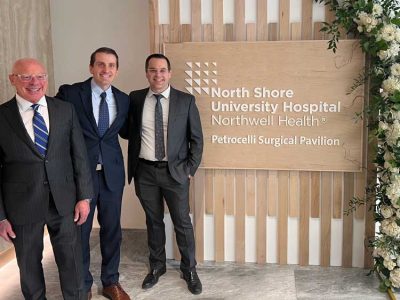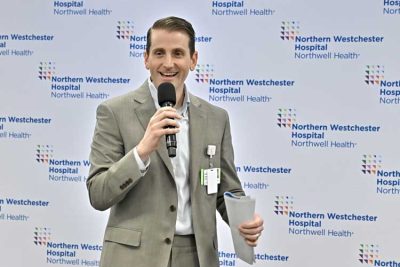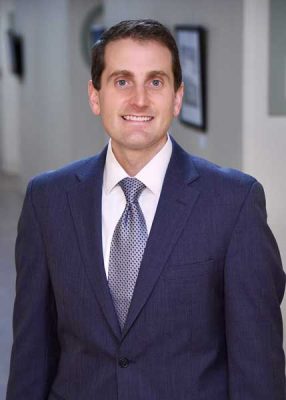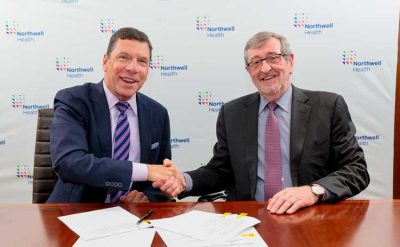Man on a Mission: NWH’s Director and the Triumph of Good Culture
Opinion Advocates for ideas and draws conclusions based on the author/producer’s interpretation of facts and data.
By Adam Stone
When Utah native Derek Anderson was coming of age in the early 2000s, and exploring how best to serve the world, his journey took him to Cambodia, where he delivered on a volunteer, self-funded mission in the city of Phnom Penh for the Church of Jesus Christ of Latter-day Saints.
He learned to speak fluent Vietnamese, and immersed himself in the culture, helping local people and families during his time in Southeast Asia, from 2002 through 2004.

But for the past nearly five years, the Lewisboro resident, just 40 years old, has been on a different mission – working as executive director of Northern Westchester Hospital (NWH), a Northwell Health facility, during a time of major upheaval and challenge in delivering quality service to a mass population.
Anderson enjoys the type of personality that radiates deep caring (as did former NWH President and CEO Joel Seligman, with a different style) and it says something about Northwell that this hospital administration wunderkind has elevated in the ranks with such success.
Two weeks ago, Examiner Editor-in-Chief Martin Wilbur and I sat down with Anderson in his tidy office at the hospital in Mount Kisco, to learn how Northwell is working to address local healthcare concerns.
From a timing standpoint, the meeting proved interesting in a pair of ways.
‘It’s a National Issue’
First off, my scoop from late last month about UnitedHealth/Optum being investigated by the U.S. Justice Department over antitrust issues, revealing a federal probe, had just been picked up by scores of national media outlets, landing on the front page of The Wall Street Journal.
Also, minutes after our meeting ended, the organization announced a game-changing merger with Nuvance Health, creating understandable patient anxiety over the growth of Northwell, already one of New York’s largest employers, with more than 85,000 people spanning 21 hospitals and more than 850 outpatient facilities.
One of the fundamental questions I was trying to better understand was how Northwell, despite its warts (it has credible critics too, like any large group) has been able to maintain a generally patient-centric culture, at least at Northern Westchester Hospital.
“Maybe the culture is dramatically different,” Anderson replied, when I referenced for-profit healthcare companies like Optum. “We’re not-for-profit. We constantly worry about how do we provide, how do we stay connected to the community and provide better care.”
To be sure, Anderson was diplomatic yet candid in our conversation, emphasizing how the hurdles facing the industry are largely systemic in nature, impacting health systems (and thus patients) across the country.
“The access to providers is really not just a New York issue or even an Optum or Northwell or any other medical group issue,” he explained. “It’s a national issue since COVID. And even in some specialties, pre-COVID, you have physician nursing, ancillary specialties that are short for talent.”
It’s Urgent
As I’d mentioned in my last column about CareMount/Optum, I planned to share some more encouraging local healthcare news, and Anderson did not disappoint in delivering the goods.
First off, NWH is poised to expand emergency department services – the hospital’s Mount Kisco ER has experienced a 17 percent surge in patient volume since 2019 – and also establish a wider network of “rapid access” across the region.
“This will greatly enhance the timeliness and quality of care and level of service our community expects from our hospital,” Public Relations Advisor Todd Dezen noted.

Northwell currently operates four urgent care centers in Westchester and three in lower Dutchess County, with plans to open several more centers in the next few years, aiming for a total of 15 to 17 locations throughout Westchester and western Connecticut.
“Real estate is always a challenge, working through the business planning on it, but the hope is that we can have something else here in Mount Kisco,” Anderson said.
As for the ER, the current infrastructure is “built for a certain level of care,” Anderson observed, noting now “we’ve now grown 17 percent beyond that.”
“We’re excited because we’re actively working with the state of New York to expand our emergency department to accommodate that need,” added Anderson, who first joined Northwell Health in 2010, ultimately overseeing operations at North Shore University Hospital in Manhasset, down on Long Island, before getting tabbed in 2019 to succeed Seligman and serve as Northern Westchester’s new captain.
(NWH also has a groundbreaking ceremony planned for the fourth quarter of this year for a modernized mother-baby unit, planning 24 spacious postpartum rooms alongside six new labor and delivery rooms, two operating rooms, spa-like bathrooms, a nearby nursery, and enhanced security measures.)
Higher Learning
The expansion of emergency services and maternal/child healthcare support are far from the only new initiatives.
To do its part in addressing the physician talent shortage, the hospital will be welcoming its first class of internal medicine residents this July.
This is a big deal.
NWH will become a resource to train clinicians on how to deliver patient-centered, evidence-based, cost-conscious care.
The other goal is to “give back to the community we serve with a focus on treating the un- and underinsured,” Northern Westchester Hospital Internal Medicine Residency Director Dr. Gary Stallings states in a letter about the program.
Given the hospital’s elite status – NWH is ranked in the top 5 percent in the nation for clinical outcomes, according to Healthgrades – this move seems to make sense on multiple levels.
Over the next five years, the hospital will be establishing itself as “a true teaching institution,” Anderson said, starting with a small number of residents and then growing the program.
“It’s not just primary care, but it’s some specialties,” he said. “The goal is to get up to about 130 residents that will be in this hospital on any given day.”
Food Friendly
Given Northern Westchester Hospital’s local prominence, it’s easy to think of parent organization Northwell as just a hospital operator.
But it’s become much more.
Half of Northwell’s total portfolio is generated outside of hospitals, Anderson said.

“We’re expanding primary care physician access that has grown to over 250 doctors,” he remarked of the local presence.
I’m not here to do the company’s PR, and stand ready to report on any future systemic concerns. But there’s real data to support the organization’s rhetoric around a caring culture, even as it rightfully keeps a hard head over financial sustainability.
Northwell has hired Michelin-starred chefs to revolutionize hospital nutrition, replacing mundane, processed fare with fresh, premium ingredients, changing the expectation around hospital food over the past seven or so years.
And it’s the organization’s investment in mental health services – not a profitable endeavor – that also helps illustrate leadership’s apparent commitment to patients.
“While many mental health facilities have closed across the country, Northwell and NWH is choosing to invest in building programs in this space to improve access,” Anderson wrote the week after our in-person interview, replying to my follow-up questions. “These are ambitious programs that don’t make money, but are vital to the health of our community.”
‘Very Extreme’
The hospital has initiated ambitious plans to expand outpatient behavioral health services, with a special focus on adolescent mental health.
I must admit, as much as I’m aware of the severity of the crisis, the size and scope of the local problem didn’t fully hit me until our interview with Anderson.
Multiple local young people every week are arriving at Northern Westchester Hospital, often suicidal, or at least in severe crisis – sometimes a half-dozen or more kids per week, and at least about two or three on average.
I found that volume absolutely startling.
But, given the insane societal pressures on young people, exacerbated by algorithmically-engineered social media poison zapped into their developing brains, I shouldn’t have been surprised.
“And remember, when they arrive at our ER, usually it’s very extreme,” Anderson soberly explained.
Only about 20 percent of U.S. children grappling with mental, emotional, or behavioral disorders receive specialized mental health care services, according to the Centers for Disease Control and Prevention.
Suicide ranks as the second-leading cause of death for children aged 10 to 14 and the third-leading cause for those aged 15 to 24.
“Certainly, it was an issue pre-COVID; COVID exacerbated it,” Anderson told us. “So the frequency seems to be increasing.”
Crisis Control
Last November, Northwell Health announced a $500 million investment to enhance pediatric mental health services and accessibility, aiming to bridge the gap between physical and mental healthcare for children.

“We know mental health is health,” Michael Dowling, Northwell president and CEO, stated in a portion of his prepared remarks at the time. “Our mission to treat patients fully also includes the mental well-being of our young patients.”
As for NWH, it is developing a $10 million local program, with about $2 million in funds already raised.
“This isn’t something that earns money, mental health,” Anderson told us. “Behavioral health is, in the U.S., a crisis because it’s not funded, which is why I think it’s even more motivating for us, because if we can do this and make it accessible to anyone with or without insurance, that, for us, is our mission.”
Complicating matters is a national shortage of available psychiatrists.
But what will the Northwell-led effort look like exactly?
The approach involves training educators to identify students in crisis, establishing urgent care centers specifically to serve adolescent mental health, providing ongoing psychiatric care, and implementing a partial hospitalization program.
“So it’s a day program,” Anderson explained. “They go home at night, but they spend effectively eight or nine hours with us in a center, actively working with their provider, integrating with other students. All of this is a model that Northwell has deployed in other markets that have been very successful and so we’re excited to bring it to Westchester.”
Noodling
I’ve been personally exploring in recent months how to utilize various mindfulness techniques to achieve greater balance in life. Over the past few weeks, I’ve incorporated five-minute tai chi routines into my daily exercise regimen, before lifting weights or riding an exercise bike.
Last year, I also wrote about NWH’s reiki program, and experienced the power of the Japanese practice myself by visiting with a private practitioner, Kristin Raniola, founder of Noelle Healing in Pound Ridge.
I knew NWH had already become a leader in offering holistic healthcare in a mainstream hospital setting.
“So culturally, as a hospital, we offer reiki therapy, we do holistic therapies,” Anderson told us, when I shared my emerging interest in eastern approaches. “We have an integrated center that employees, any time of the day, can go down and with a specialist, get a 10-minute massage, do a quick guided meditation and then go back into the stress.”
But I wondered whether more could be done – perhaps a brick and mortar, outpatient facility offering expanded energy healing services, emblazoned with Northwell/NWH’s powerful mainstream imprimatur, a concept I referenced in an earlier piece.
It’s wonderful that the hospital already offers treatment to inpatients and staff.
What about the stressed-out general population?
“I think it’s a great idea,” Anderson replied. “I’d love to noodle on that.”
Medical Street Cred
Anderson also enjoys what I’d call street cred with the local medical staff.
During his undergraduate training, he worked at Intermountain Healthcare in Utah, a trauma hospital, performing in the operating room for four years.
“Assisting in surgery and learning logistics in a hospital early in my career allows me today to understand the frontline challenges the team faces, and how to empathize and support them better,” he said.
When Anderson makes his rounds these days, local healthcare workers likely know they’re talking to a caring, informed, experienced medical colleague, not a cold administrative bean counter.
I was thinking further last week about the type of leadership Anderson appears to display, and what might set NWH apart from the likes of UnitedHealth/Optum, a publicly-traded multinational conglomerate.
Over text, I followed up with Anderson to ask whether Northwell’s nonprofit status, while not a shield from folly, helps set the tone, with a mission-driven approach baked into the structural cake.
In short, he replied with an enthusiastic yes.
Kind Intentions
Beyond the focus on mental health, Anderson pointed to the organization’s investment in gun violence prevention, education and even programs like the President’s Council, a quarterly forum where NWH engages in conversation with local community leaders.

“When I think of what sets us apart as a nonprofit, mission-driven hospital and system, we are driven by constantly improving the quality and because the need exists in the community, not necessarily because it drives revenue,” Anderson wrote.
Yet one daunting challenge facing local leadership is working to ensure the organization is able to preserve a positive culture while expanding its footprint under the umbrella of a massive operation, an even more pressing issue in the aftermath of the Nuvance merger.
When I was at Phelps last year, multiple longtime clinicians besieged me with unsolicited, detailed stories about Northwell cutbacks, lamenting the financial metrics that drive decisions, as staff-favored medical supplies gave way to cheaper alternatives.
They were mourning a diminished sense of working for a true community hospital.
Even though every group has its shortcomings, what distinguishes a good culture from a rotten one is the commitment of decision-makers to thoughtfully explore the nooks and crannies of their organizations with the best of intentions.
We’re lucky to have Anderson noodling away in that contemplative matter on our behalf.
Adam Stone is the publisher of Examiner Media. E-mail him with tips and feedback at astone@theexaminernews.com.

Adam has worked in the local news industry for the past two decades in Westchester County and the broader Hudson Valley. Read more from Adam’s author bio here.
